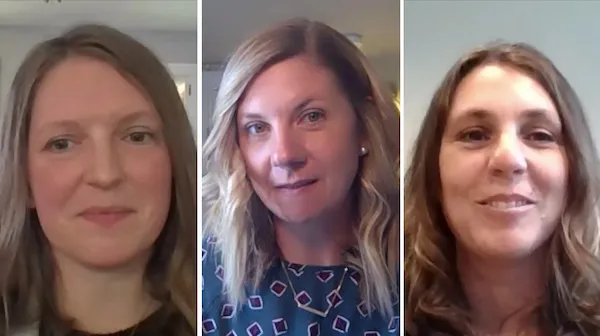This week’s PMA Virtual Town Hall looked at the changes that have taken place in the workforce in the past year, and how the events of the pandemic have disrupted our work life – the way we work has changed and this has changed the needs of the workforce. Megan Nash, Director of Programs at the Center for Growing Talent, led Heather Siddle Kinney, Corporate Counsel/Director of HR at Tom Lange, and Colleen Moore, Recruitment Manager at Four Seasons Produce, Inc. in a conversation about how they have adapted to the changes of the past year.

Heather Siddle Kinney, Megan Nash and Colleen Moore.
Changes in the hiring process
While the world was turned upside down, one thing remained constant: people need to eat, and produce is a vital part of everyone’s diet. So, for companies such as Tom Lange and Four Seasons Produce, the hiring process did not come to a halt. “We have definitely seen the need to hire more people over the course of the last year and we have had to switch up our hiring process to accommodate the safety regulations,” says Siddle Kinney.
After close to a year of the pandemic, Siddle Kinney and the Tom Lange team have figured out a system that works well for them. “For us, one of the most important factors we look for in hiring is if the person will fit well with our culture – personality is just as, if not more, important than their qualifications. It is really difficult to get a good feeling for that virtually, so our hiring process has actually been extended now. What could be done in one or two interviews in person is now done in two to three interviews virtually. It’s also not uncommon for us to give them an offer that is contingent to them coming to the office in person first to see if they jive well with our company culture,” she explains.
For Moore, the situation is even more complicated because Four Seasons has multiple warehouse positions that cannot accommodate working remotely. “During interviews, the safety of the workplace and what is being done to keep workers safe has become an entirely new and common topic of discussion. It has become an important aspect of the interview process and when we bring people in, we ensure that they see all the precautions we take. We also try to be cognizant of people’s comfort levels – if they don’t have the right comfort level for coming in, we respect that and we have been able to make offers after virtual interviews, though it does remain difficult to judge if they will be the right fit. In the end, it’s all about being really up front with each other,” Moore explains.
Other recruiting changes
Besides the changes brought about by the pandemic, there are other changes to the recruitment process as well that have become evident over recent years. “We have really had to start thinking outside of Indeed for posting and recruiting,” Siddle Kinney shares. “We aren’t getting the same influx of resumes from there anymore, and often the responses we do get lose interest in the position quickly. We have started to post more in industry specific places or work with outside recruiters.”
Moore adds: “We have noticed that people are more interested nowadays in finding a job they are passionate about rather than just something to pay the bills. So that means that we, as an organization and as an industry, have to try to speak to people’s passions. We have to show off the values we have in our industry and as recruiters we have to look beyond resumes and pull out the candidates’ passions. That is the key to grabbing the top talent who will become a long-term and top employee: someone who finds their passion in the job.”
Flexibility is key
In the day-to-day operations, there have, of course, been many changes too. Being flexible and able to pivot quickly has always been important but during the pandemic it has become even more important. “We do have many people on our team who prefer to work in the office, so we have had to find ways to make that possible while ensuring everyone’s safety – such as through split schedules,” says Siddle Kinney.
Tom Lange has offices throughout the US, so that adds another level of complexity: “We have to keep an eye on the local state and city regulations for each of our offices and adjust our approach accordingly. Technology plays a very important role in all of this; you need the right technology to be able to allow people to work from home while still keeping your team together,” she adds.
“I don’t think that when we get out on the other side of this that everyone will flock back to the office. Offices won’t look how they did pre-pandemic again, I believe,” Moore says. “But it’s important for the leadership of a company to be on board with this, they need to be interested in providing that flexibility,” she concludes.
Next week’s virtual town hall will explore ag-tech and will look at ag-tech startups and the innovative ways they have secured capital funding for their technology initiatives. The panel will look at what areas of ag-tech gained the attention of venture capitalists in the last year. Ag-tech companies will discuss what it took for them to fundraise successfully during the Covid period.
